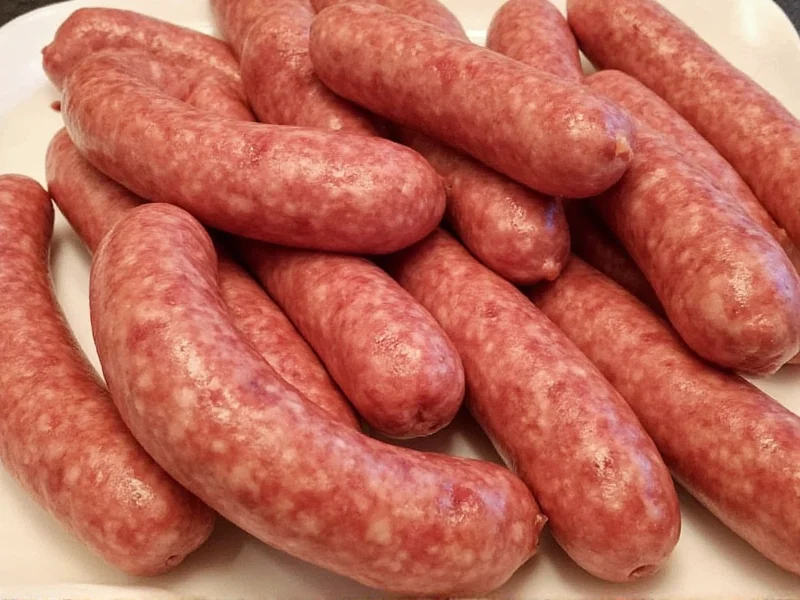Making deer summer sausage transforms lean venison into a flavorful, shelf-stable product perfect for hunters and home processors. This traditional preservation method combines lean deer meat with pork fat for optimal texture, then cures and smokes the mixture to create a delicious snackable sausage that requires no refrigeration until opened.
Essential Equipment for Deer Summer Sausage
Before starting your venison summer sausage preparation, gather these critical tools:
| Equipment | Purpose | Alternative Options |
|---|---|---|
| Meat grinder (22mm or 32mm plate) | Proper texture development | Commercial grinding service |
| Vacuum stuffer or manual stuffer | Air-free casing filling | Hand-crank stuffer attachment |
| Smoker or smokehouse | Controlled temperature smoking | Oven with smoke generator |
| Accurate digital thermometer | Food safety monitoring | Multiple calibrated thermometers |
| Collagen or fibrous casings (32mm) | Proper casing size for summer sausage | Natural hog casings (larger diameter) |
Perfect Venison Summer Sausage Ingredients
The right ingredient balance transforms lean deer meat into moist, flavorful summer sausage. For a 5-pound batch:
- 3.75 lbs (60%) venison trimmings (from hindquarters)
- 1.25 lbs (20%) pork back fat (20% fat content)
- 4 oz (6.25%) cold water or unsweetened apple juice
- 1 oz (1.5%) summer sausage seasoning blend
- 0.8 oz (1.25%) non-iodized curing salt (Prague Powder #1)
- 0.4 oz (0.625%) granulated garlic
- 0.2 oz (0.3125%) black pepper
- Optional: 0.1 oz red pepper flakes for heat
Temperature control proves critical during deer meat sausage preparation. Keep all ingredients below 35°F throughout processing to prevent fat smearing, which ruins texture. Many hunters making summer sausage for the first time overlook this crucial detail, resulting in greasy, crumbly finished product.
Step-by-Step Deer Summer Sausage Process
1. Meat Preparation
Cut venison and pork fat into 1-inch cubes, removing any silver skin or connective tissue. Partially freeze the meat mixture for 30-45 minutes until firm but not solid. This temperature range (28-32°F) ensures clean grinding without fat smearing.
2. Grinding and Mixing
Grind meat mixture twice through a 3/8-inch plate into a chilled bowl over ice. Add seasonings and 4 oz cold liquid. Mix vigorously for 3-4 minutes until sticky and emulsified (the "bind" stage). Proper mixing develops proteins that hold fat in suspension.
3. Stuffing Technique
Fill casings slowly, avoiding air pockets. Twist into 6-inch links, leaving 2 inches of casing between links. Prick any visible air bubbles with a sterile needle. Overstuffing causes bursting during smoking, while under-stuffing creates dry spots.
4. Smoking Schedule for Perfect Results
Follow this precise temperature progression for safe, flavorful deer summer sausage:
| Stage | Smoker Temp | Duration | Internal Temp | Process Goal |
|---|---|---|---|---|
| Drying (Smoke Set) | 120°F | 60 min | 100°F | Form smoke ring, dry casing |
| Slow Cook | 140°F | 60-90 min | 130°F | Gentle fat rendering |
| Final Cook | 160°F | Until 155°F | 155°F | Pathogen elimination |
| Shower | Cold water | 10 min | 100°F | Stop cooking process |
Critical Safety Considerations for Venison Sausage
Deer meat carries unique food safety challenges compared to domestic meats. Always use Prague Powder #1 (6.25% sodium nitrite) at the 1 oz per 25 lbs ratio. This prevents botulism in shelf-stable products and develops characteristic flavor. Never substitute regular salt for curing salt.
Temperature control remains non-negotiable during the entire process. The "danger zone" (40°F-140°F) must be traversed efficiently. Monitor internal temperature with a calibrated instant-read thermometer, inserting it into the thickest part of the sausage without touching the casing.
Troubleshooting Common Deer Sausage Problems
- Dry, crumbly texture: Insufficient fat content or overcooking. Maintain 75% lean to 25% fat ratio and remove at exactly 155°F internal temperature.
- Greasy appearance: Fat smearing from warm grinding temperatures. Chill all components thoroughly before processing.
- Mold growth: Inadequate drying after smoking or improper storage. Allow 24 hours cooling before refrigerating, and store in vacuum-sealed bags.
- Bland flavor: Under-seasoning or insufficient mixing time. Follow exact seasoning measurements and mix until sticky.
Flavor Variations for Homemade Summer Sausage
While traditional summer sausage uses simple pepper seasoning, venison's rich flavor accommodates creative variations:
- Pepper Jack Style: Add 4 oz shredded pepper jack cheese during mixing
- Teriyaki Ginger: Replace water with brewed ginger tea and add 1 oz teriyaki seasoning
- Apple Cinnamon: Use apple juice instead of water with 0.5 oz cinnamon and 0.25 oz allspice
- Spicy Jalapeño: Incorporate 2 oz finely diced pickled jalapeños and 0.25 oz cayenne
When experimenting with deer summer sausage seasoning blends, maintain the critical 75/25 meat-to-fat ratio and proper curing salt measurements. Flavor additions should not exceed 5% of total batch weight to preserve texture and safety.
Storage Guidelines for Shelf-Stable Sausage
Properly processed summer sausage becomes shelf-stable through the curing and smoking process. Follow these storage recommendations:
- Unopened: Store in a cool, dark place for up to 6 weeks
- Refrigerated: Vacuum-sealed sausage lasts 3 months
- Frozen: Maintain quality for up to 1 year
- After opening: Consume within 3 weeks under refrigeration
Always inspect sausage before consumption. Discard if you notice off odors, slimy texture, or unusual discoloration. Properly made deer summer sausage should have a firm texture, rich reddish-brown color, and pleasant smoky aroma.











 浙公网安备
33010002000092号
浙公网安备
33010002000092号 浙B2-20120091-4
浙B2-20120091-4